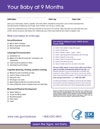Important Milestones: Your Baby at Nine Months
How your child plays, learns, speaks, and acts offers important clues about your child’s development. Developmental milestones are things most children can do by a certain age.
Check the milestones your child has reached by the end of 9 months. Take this with you and talk with your child’s doctor at every visit about the milestones your child has reached and what to expect next.
What most babies do at this age:
Social and Emotional
- May be afraid of strangers
- May be clingy with familiar adults
- Has favorite toys
Language/Communication
- Understands “no”
- Makes a lot of different sounds like “mamamama” and “bababababa”
- Copies sounds and gestures of others
- Uses fingers to point at things

Cognitive (learning, thinking, problem-solving)
- Watches the path of something as it falls
- Looks for things he sees you hide
- Plays peek-a-boo
- Puts things in her mouth
- Moves things smoothly from one hand to the other
- Picks up things like cereal o’s between thumb and index finger
Movement/Physical Development
- Stands, holding on
- Can get into sitting position
- Sits without support
- Pulls to stand
- Crawls
Act early by talking to your child’s doctor if your child:
- Doesn’t bear weight on legs with support
- Doesn’t sit with help
- Doesn’t babble (“mama”, “baba”, “dada”)
- Doesn’t play any games involving back-and-forth play
- Doesn’t respond to own name
- Doesn’t seem to recognize familiar people
- Doesn’t look where you point
- Doesn’t transfer toys from one hand to the other
If You’re Concerned – Act Early
Tell your child’s doctor or nurse if you notice any of these signs of possible developmental delay for this age, andtalk with someone in your community who is familiar withservices for young children in your area, such as your state’s public early intervention program. For more information, visit our "If You’re Concerned" web page or call 1-800-CDC-INFO.
The American Academy of Pediatrics recommends that children be screened for general development using standardized, validated tools at 9, 18, and 24 or 30 months and for autism at 18 and 24 months or whenever a parent or provider has a concern. Ask your child’s doctor about your child’s developmental screening.
“Learn the signs. Act early.” materials are not a substitute for standardized, validated developmental screening tools.
Adapted from CARING FOR YOUR BABY AND YOUNG CHILD: BIRTH TO AGE 5, Fifth Edition, edited by Steven Shelov and Tanya Remer Altmann © 1991, 1993, 1998, 2004, 2009 by the American Academy of Pediatrics and BRIGHT FUTURES: GUIDELINES FOR HEALTH SUPERVISION OF INFANTS, CHILDREN, AND ADOLESCENTS, Third Edition, edited by Joseph Hagan, Jr., Judith S. Shaw, and Paula M. Duncan, 2008, Elk Grove Village, IL: American Academy of Pediatrics.

Contact Us:
- Centers for Disease Control and Prevention
National Center on Birth Defects and Developmental Disabilities
Division of Birth Defects and Developmental Disabilities
1600 Clifton Road
MS E-87
Atlanta, GA 30333 - 800-CDC-INFO
(800-232-4636)
TTY: (888) 232-6348
New Hours of Operation
8am-8pm ET/Monday-Friday
Closed Holidays - cdcinfo@cdc.gov





